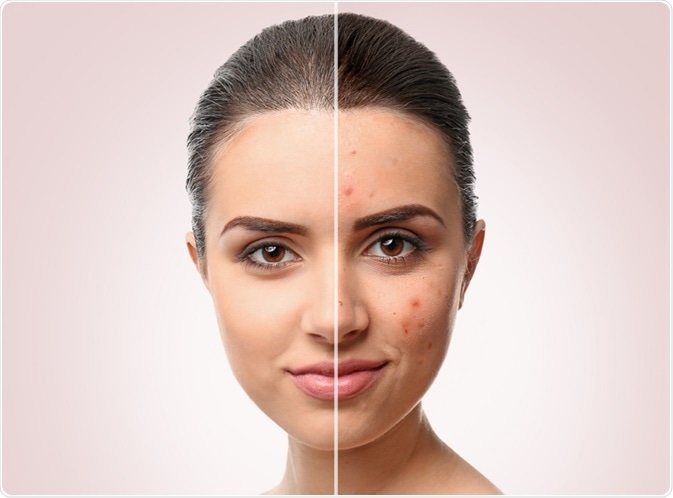Acne is a common skin condition that affects people across several age groups, from adolescence to middle age. A strong family history is usually present in acne patients.
 Africa Studio | Shutterstock
Africa Studio | Shutterstock
Acne is fundamentally a disorder of the pilosebaceous units of the skin, which consist of the hair follicles and the attached sebaceous glands. These glands produce an oily secretion called sebum, which escapes from the hair follicle through the canal opening on to the skin surface.
The hair follicles are lined with keratinocytes, which give rise to the hairs on the skin. These mature and are released from the surface.
Plugging of the canal orifice is responsible for the basic acne lesion – this involves the development of a closed comedo, which is a blocked and swollen hair follicle distended with sebum and cellular debris.
Risk factors for acne
Predisposing factors include:
- Colonization of the follicles by the skin bacteria, especially Propionibacterium acnes
- Overproduction of sebum by the glands
- Increased shedding of keratinocytes within the follicle
- Release of inflammatory chemicals
The causes of acne are not yet identified, but are thought to include genetic, environmental, and individual skin factors. Oily skin is associated with acne, yet all individuals with oily skin do not suffer from the condition. Similarly, chocolate and greasy foods have not been proved to cause acne outbreaks to a greater extent than other foods.
Are genetic factors involved in acne?
A strong family history is usually present in acne patients. Many school-going children with acne have parents or siblings who had/have acne.
A study on acne in twins in the US showed that both twins had a high risk of inheriting acne. This was reported again in an Australian study involving adolescent twins. When monozygotic versus dizygotic twins were studied for the composition and production of sebum, monozygotic twins showed a higher degree of correlation with regard to sebum excretion as well as the percentage of branched fatty acids in sebum from different individuals. Thus previous studies showed a heritability estimate ranging from 50-90% for acne. In other words, approximately 50-90% of acne was due to genetic variation in the affected individuals.
A large UK study involving 400 twin pairs showed that 81% of acne was due to genetic factors. Important findings from this study include:
- Up to 47% of twins with acne had at least one sibling with acne. In contrast, only 15% of twins without acne reported having another sibling who had acne. Current knowledge regarding acne therefore points to genetic factors as predominating in its causation. This may be related to androgen levels or apolipoprotein levels, which are affected by genetically determined biochemical variations between individuals.
- A fourth of twins with acne reported that one or both parents were positive for a history of acne, in contrast to only 4% of non-acne twins.
- Finally, the transmission of acne was also studied, with 41% of twins with acne having one or more children who also had acne. Only 17% of twins without acne had children suffering from the condition.
Another study performed upon teenage Americans of European origin who had severe acne found that the risk of developing acne in this population was 2.44 times higher than in the general population. This was a genome-wide association study (GWAS), and it revealed the association of severe forms of acne in teenagers with the SNP rs4133274 locus on chromosome 8q24. The G-variant of this allele was the acne-producing form. This gene is also upstream of the MYC region which is linked to androgen regulation, as well as being a proto-oncogene.
It is noteworthy that individuals with a history of severe teenage acne have a higher risk of prostate and breast cancer. It is suggested that the three conditions are linked through MYC-regulated androgen overproduction.
Further Reading
Last Updated: Nov 16, 2018